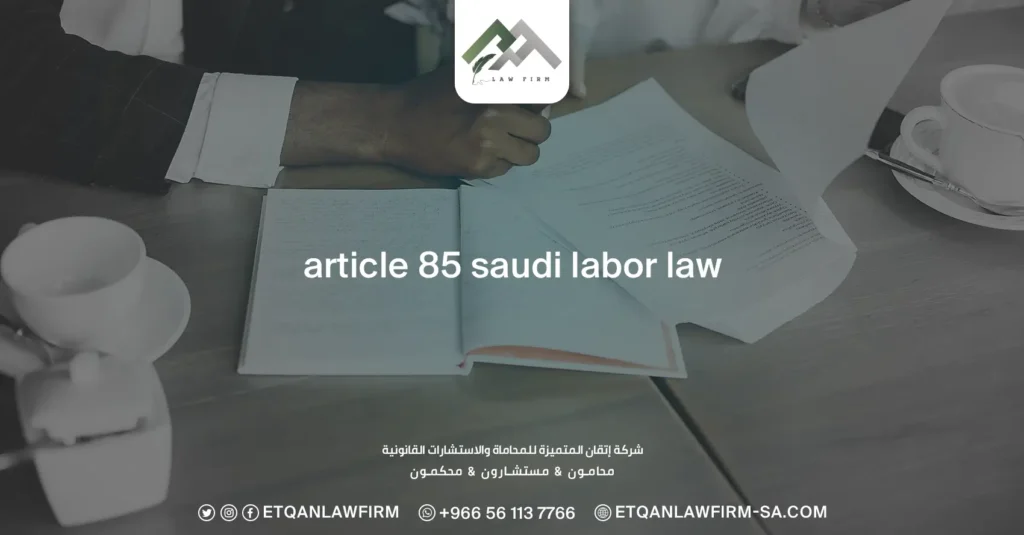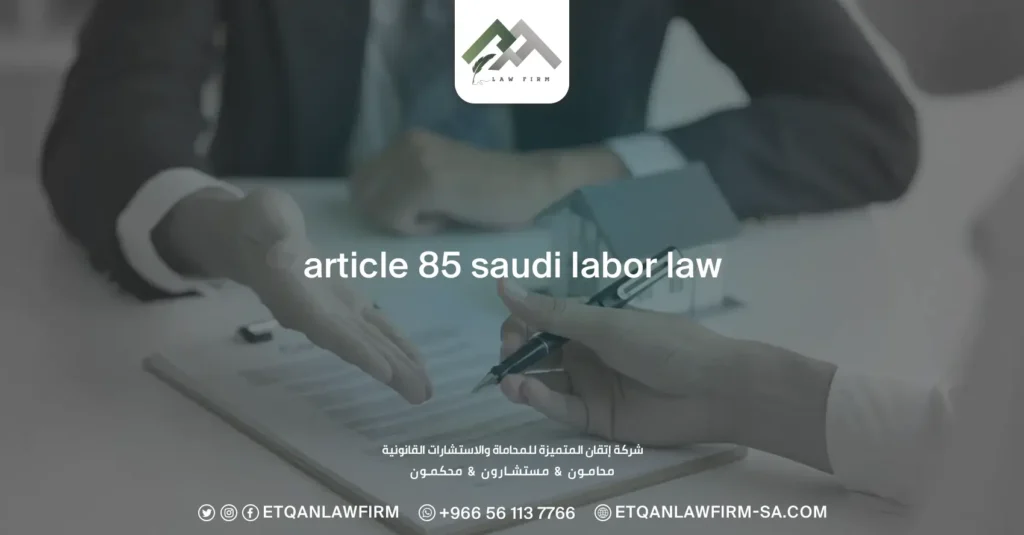
Article 85 Saudi labor law outlines the fundamental rights regarding end-of-service benefits that employers must grant to employees upon the termination of the employment relationship. In the Kingdom of Saudi Arabia, the Labor Law regulates these benefits through specific articles, with Article 85 being one of the most notable. This article clarifies how end-of-service benefits are calculated in the event of employee resignation, with rights differing based on the length of service. In this article, we will review the details of article 85 Saudi labor law, explain how to calculate the benefits based on service duration, and discuss the reasons that may prompt an employee to resign.
المحتويات
Explanation of Article 85 Saudi Labor Law
When discussing end-of-service benefits in the event of resignation, it is necessary to first clarify what is meant by resignation. Resignation means that the employee notifies the employer or their representative of their desire to terminate the employment relationship voluntarily, whether the contract is fixed-term or indefinite.

Reasons for Resignation
There are various reasons that prompt an employee to resign, the most prominent of which are:
- Relocating to another area.
- Seeking a job opportunity with a better salary.
- The desire to complete studies or training in a specific field.
These reasons, despite their legitimacy, do not entitle the employee to the full end-of-service benefits, given that the termination of the relationship occurred at the employee’s own request, not for a reason attributable to the employer. Therefore, Saudi labor law article 85 sets out the rules governing entitlement to end-of-service benefits in the event of resignation, as follows:
Read also: Article 74 Saudi Labor Law: Contract Termination Reasons
1. If the length of service is less than two years
If an employee resigns before completing two years of service, they are not entitled to any benefits for their period of service.
2. If the length of service is two years or more, but does not exceed five yearsIn this case, the employee is entitled to one-third of the end-of-service benefits stipulated in Article 84 of the Labor Law.
Illustrative Example:
- If an employee resigns after four years and eight months of service, and his last salary was 4,000 riyals, the benefits is calculated as follows:
1. Calculate the number of days of service:
4 years x 360 days = 1,440 days
8 months x 30 days = 240 days
Total = 1,680 days
2. Calculate the benefits according to Article 84 (half a month’s wages for each year):
4,000 x 1,680 ÷ 720 = 9,333.33 riyals (full benefits)
3. Entitlement to only one-third of the benefits:
9,333.33 x 1/3 = 3,111.11 riyals
Due end-of-service benefits = 3,111.11 riyals
3. If the length of service exceeds five years but does not exceed ten years,in this case, the worker is entitled to two-thirds of the end-of-service benefits.
Check out: End of Service Benefits Saudi Labor Law: Rights After Contract Termination
Illustrative Example:
- If an employee resigns after seven years and three months of service, and his last salary was 5,000 riyals, the bonus is calculated as follows:
1. Bonus for the first five years (half a month’s salary for each year):
5,000 x 5 ÷ 2 = 12,500 riyals
2. Bonus for the period after five years (full month’s salary for each year):
5,000 x 2 + (5,000 ÷ 12 x 3) = 10,000 + 1,250 = 11,250 riyals
3. Total bonus due:
12,500 + 11,250 = 23,750 riyals
4. Only two-thirds of the bonus is due:
23,750 x 2/3 = 15,833.33 riyals
Bonus End of service benefits due = 15,833.33 riyals
4. If the employee has served for ten years or more, the employee is entitled to the full end-of-service benefits stipulated in article 85 Saudi labor law.

Illustrative Example:
- If an employee resigns after 11 years of service, and his last salary was 6,000 riyals, the benefits is calculated as follows:
1. Benefits for the first five years (half a month’s salary for each year):
6,000 x 5 ÷ 2 = 15,000 riyals
2. Benefits for the next six years (full one month’s salary for each year):
6,000 x 6 = 36,000 riyals
3. Total benefits due:
15,000 + 36,000 = 51,000 riyals
End-of-service benefits due = 51,000 riyals.
Differences Between Article 84 and Article 85 of the Labor Law
In conclusion, article 85 Saudi labor law provides a clear legal framework regarding end-of-service benefits in the case of employee resignation. It is essential for employees to be aware of their rights and obligations under this article, as the length of their service directly impacts the value of the benefits due. Whether the duration of service is less than two years or exceeds ten years, understanding these rules helps employees make informed decisions about their career paths and ensures their financial rights are protected upon the termination of their employment relationship
Learn about: Saudi Arabia New Marriage Law: Legal Consultations – Etqan
The Etqan Al Mutamayza Law Firm can provide the necessary support. You can contact their team
through the following mobile numbers: 056113776, 0541110440, 504315333
Alternatively, you can visit our branches:
- Jeddah: Al-Aziziyah District–Mohammed bin Abdulaziz Street (Tahlia)
- Riyadh: King Abdulaziz Street – In front of Kingdom
- Dammam: Al-Ashri’a Street, Al-Badeea, Dammam 32415.
(FAQs):
1: What happens if I resign before completing two years of service?
If an employee resigns before completing two years of service, they are not entitled to any end-of-service benefits for that period. This policy is outlined in article 85 Saudi labor law.
2: How is the end-of-service benefit calculated if I resign after more than two years but less than five years?
If an employee resigns after completing two years but not exceeding five years, they are entitled to one-third of the end-of-service benefits. For example, if your last salary was 4,000 riyals and you served for four years and eight months, your calculated benefits would amount to 3,111.11 riyals.
3: What are my rights if I have worked for ten years or more and decide to resign?
If an employee has served for ten years or more, they are entitled to the full end-of-service benefits as stipulated in Article 84 of the Labor Law. This means you will receive the complete calculation based on your service duration and last monthly salary. For instance, if your last salary was 6,000 riyals after 11 years, your total benefits due would be 51,000 riyals.
